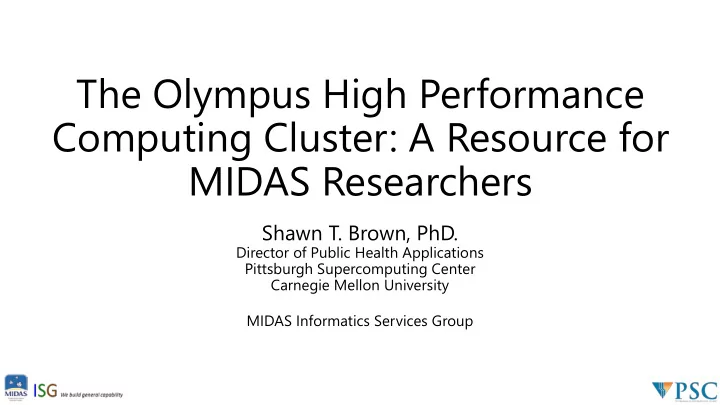

The Olympus High Performance Computing Cluster: A Resource for MIDAS Researchers Shawn T. Brown, PhD. Director of Public Health Applications Pittsburgh Supercomputing Center Carnegie Mellon University MIDAS Informatics Services Group
What is Olympus? Olympus is a supercomputing cluster provided free of charge to MIDAS Researchers. What can I do with Olympus? Run simulations, host services, store data sets, “Big Data” analytics… How do I get access to Olympus? Sign up for an account at: http://www.epimodels.org Can I get support? HPC Services and PSC Staff stand ready to help you get started.
Olympus • 69 Compute Nodes, 2,684 CPUs, 16 TB of RAM • 8 64-core AMD 2.3 Ghz Processors with 512 GB of RAM • 16 64-core AMD 2.3 Ghz Processors with 256 GB of RAM • 20 28-core Intel Xeon Ex Series 2.3 Ghz Processors with 128 GB of RAM • 20 28-core Intel Xeon Ex Series 2.3 Ghz Processors with 256 GB of RAM • One “Big Data” 56-core Intel Xeon 2.3 Ghz Processors with 1TB of RAM • 7 Application Servers • Hosting ISG Webservices, Databases, and MIDAS Applications • Large High Performance File Storage • 140 TB of High Speed Shared File System • Local Disk and SSD Based File Storage • Connected by Intel OmniPath Interconnect
Olympus (Translated To English) • L arge capacity of CPUs brings time to solution down • Large scenario spaces all at once • Large parameter sweeps all at once • Large shared memory nodes • Highly flexible support for virtually any type of modeling • Highly flexible support for all types of programming models (R, Python, C++, Java) • Larger more detailed simulations • “Big Data” Capabilities • Larger more complex data analytics with large memory nodes connected to high speed parallel file system • Host large datasets and make accessible to external tools and people
Olympus (Translated To English) • Develop your applications • Application nodes connected to high performance computing to host your applications • Locating at PSC provides extreme bandwidth to outside world (free of charge to MIDAS) • Fastest high speed interconnect available on the market • Located at the PSC • Backed by 30 years of experience in supporting researchers in getting science done Delivered over 5 million CPU hours of computing to MIDAS Investigators
Providing Olympus: Sample Success Stories “For agent-based microsimulation, it is essentially impossible to do without truly substantial resources such as the Dr. Travis Porco cluster offered. For particle filtering, the cluster enabled fast development times and surge capacity to meet UCSF deadlines.” • Conducted dynamic particle filtering models for fitting the Ebola epidemic • Implemented agent-based models of contact investigation in measles and transmission of HIV through a dynamic contact network of intravenous drug users. • Two publications resulted from this work (PMID 26484544, 25928152) Dr. Wilbert Van Panhius and Guido “The large amounts of memory available on the Olympus Cluster allowed us to run our very large simulations as well Carmargo España as run a large number of them to produce a meaningful study.” University of Pittsburgh • Simulated the geographic spread of Chikungunya during the 2014-15 epidemic in Columbia with with the FRED agent-based model. • Each simulation involved 50 million agents and required large amounts of RAM memory to run an individual instance Dao Nguyen and Dr. Edward Ionides “By providing an easy-to-use applications programming interface (API), all I have to do is to model and fit data and the University of Michigan tasks used to take days or week can now run in hours, making the tasks feasible and enjoyable.” • Utilized Olympus to fit malaria models with control using simulation-based interfaces written in R. • Work is currently under review in the Journal of Statistics and Computing. Drs. Sam Ventura and William Eddy “Because we have access to Olympus, we are able to obtain major speed-ups on tasks that would take several days to complete, allowing Carnegie Mellon University us to be responsive to the MIDAS Research Network in a manner that would otherwise not be possible.” • Generating synthetic ecosystems for different countries and geographic regions in urgent response to disease outbreaks. • Utilized Olympus high-performance large shared filesystem to provide immediately and automatically synthetic ecosystems to the public.
Olympus User: Apollo Web Services FRED PSC Apollo FluTE Simulator Web Service Services Open Malaria The PSC Simulator Service A software developer can send connects the Apollo CLARA a single infectious disease Network to the simulators scenario to the Apollo Network hosted on Olympus. and run it on multiple simulators.
Olympus User: SPEW Synthetic Ecosystems Olympus R Application Server Store Resultant Synthetic Ecosystem Data SPEW SPEW Webservice Toolkit Serve up data for public through webservices Olympus Shared Delivered to public via epimodels.org Compute intensive Data Store creation of synthetic ecosystems Census Full automated end to end solution for creating Info new synthetic ecosystems
HPC Services: Creating Accessible Web Services Apollo Web Services HPC Web Services Translates Standard Inputs Brokers Disease into Disease Transmission Transmission Model Runs Model Specific Inputs End-user applications Cloud Computing Calls service and receives data Apollo Data Apollo Data Olympus XSEDE Store Services Stores Inputs and XSEDE 1 XSEDE 3 XSEDE 4 Outputs Bridges
Acknowledgements • Olympus is funded through MIDAS U24 “Informatics Services Group”
Olympus available to you • Freely available to all MIDAS Researchers • Sign up for an account at: http://www.epimodels.org • Also watch the YouTube video at: https://youtu.be/8DoMUjl_yCw • Please join us for the discussion afterwards: • We want to hear what you need and how we can make Olympus useful to you.
Recommend
More recommend